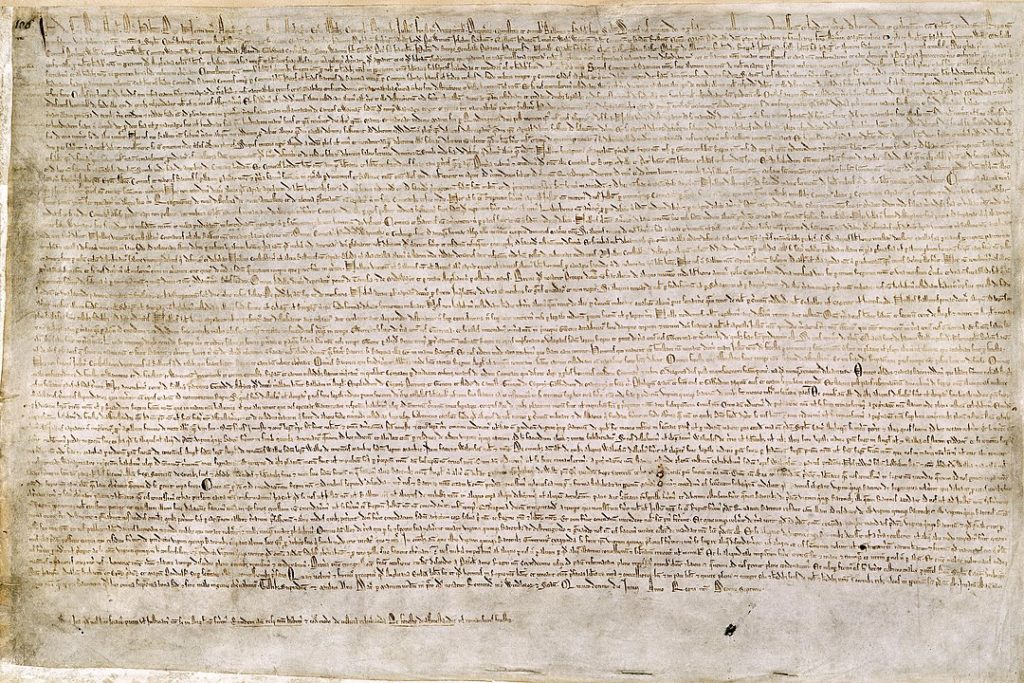
I learned this today. The Magna Carta promised the protection of church rights and the protection of the barons from King John and eventually became the basis for English common law. By extent, its concepts are also the basis for some American and Canadian laws as well. It was the first time the idea that the law was a power in itself and not seated in the throne was raised.
King John came to the throne of England in 1199 when his brother King Richard the Lionheart died. King Richard was a fairly poor king, but he made up for it by being an extremely successful warrior. He put down rebellions, led campaigns in France, had many victories against Saladin, and ended up being killed in France. He only spent ten months of his ten-month reign in England and he used that to raise money for his campaigns. He was able to control his barons, but had very little interest in kingly duty. If he hadn’t died when he did, maybe there would have been no Magna Carta.
Richard was a bad king because he had no interest in his responsibilities, his younger brother John was a bad king because he was too invested in being king. He had even tried to, unsuccessfully, usurp the throne while his brother Richard was away in France. During his reign, John lost most of the English lands in France, he was excommunicated by the pope, he was greedy, a poor administrator, a poor warrior, and he faced a civil war at home. I think it is safe to say that had any other king been on the throne, the story of the Magna Carta would have been very different.
Before the Magna Carta, kings of England ruled by vis et voluntas “force and will”. A king was above the law and could do no wrong. The king also was the law. John came to the throne in 1199, on the death of his brother Richard. Within 5 years, he had lost most of the lands in France to King Philip II. He saw this as a personal failure and desperately wanted to take them back, raising taxes extensively in England to finance the campaigns. By 1214, he had lost all of these campaigns and had to raise even more money to sue for peace and pay compensation.
John returned to England without money and without a victory. For years, his barons had been becoming angrier and angrier as John raised their taxes again and again. John had sold church offices to help pay for the war, angering Pope Innocent III. He had mistreated prisoners and hostages, taken the law into his own hands, and seized some of his baron’s estates. It is even rumored that he had affairs and fathered children with the wives of several noblemen. The barons had had enough.
A group of rebel barons gathered in Northampton in May 1215 and marched on London, Lincoln, and Exeter. Stephen Langton, the archbishop of Canterbury was working with the barons to come up with a list of demands to put to the King.
King John met the barons at Runnymede on 10 June 1215. Over the next ten days, with the help of Langton, they came up with the text for the Magna Carta. King John didn’t want to sign it but he faced civil war if he didn’t, so he had no choice.
Most of the clauses in the Magna Carta were straightforward forward and John had no real problem with them. It said that John wouldn’t interfere with the church, he wouldn’t imprison the barons without trial, he would stop unfair taxes, he would not ask for extra taxes, and he would let merchants go about their business without taxing them heavily. The problem came with “clause 61”. This clause said that the barons had the power to seize the castles and lands of King John if he disobeyed the treaty. It was the first charter in English history that gave anybody the power to punish the king if he didn’t stick to the rules.
John had no choice and signed it, but he didn’t abide by it. The barons hadn’t really expected him too and they declared war. King John died in October 1216 and he was succeeded by his son, Henry III, who was only nine years old.
King Henry signed a revised version of the charter in 1217. The signing of the charter pretty much ended the Barons’ War, but Henry was still a minor and people thought that he might not abide by it. In 1225, as an adult, the barons made him sign a new version of the charter in return for taxes. Henry needed money for an army to fight in France and the barons withheld the money until he signed. Henry signed it in his own name. He signed a fourth version of the charter in 1253 in return for more taxes.
The final version of the Magna Carta was signed in 1297 by King Edward I. He also signed it in return for tax money. This is the version that became the basis for English law. Copies were made and distributed to cathedrals around the land.
The Magna Carta has become a part of the principles of English Law. It went through many revisions. It is important as the first document to say that the king and his government were not above the law and were subject to consequences. It stopped the king from exploiting power and placed limits on royal authority by establishing the law as a power in itself. And this is what I learned today.
Photo By Earthsound. – https://commons.wikimedia.org/w/index.php?curid=78606
Sources:
https://www.bl.uk/people/king-john
http://www.castlefordacademy.com/wp-content/uploads/2021/12/Magna-Carta.pdf
https://www.history.com/this-day-in-history/magna-carta-sealed
https://www.britainexpress.com/History/Richard_the_Lionheart_and_King_John.htm
https://www.bbc.com/news/magazine-12603356
https://www.history.com/topics/british-history/magna-carta
